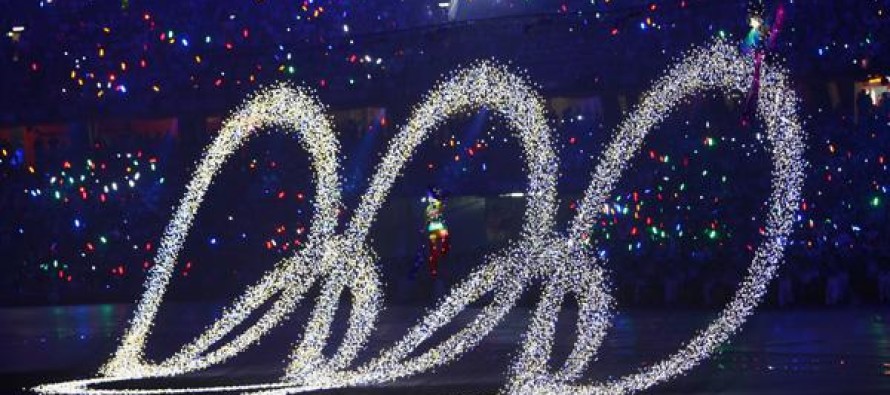Eighth wonder of the world – John Huxley

With military bands, teams of terracotta warriors and a thunderous roll of drums, China last night welcomed the world to the opening of the most spectacular and, some would say, the most controversial Games in the 112-year history of the modern Olympics.
It was a ceremony seemingly made in heaven, featuring spacemen, flocks of doves, a dreamy, flutter-by of fairies and fireworks – thousands of fireworks.
In 50 fleeting minutes, rich in colour and choreography, they dramatically showcased more than five millenia of Chinese history for 91,000 spectators and an estimated television audience of 4 billion. Even "lao tian ye", the heavenly grandfathers earlier invoked by Wang Wei, secretary-general of the BOCOG organisers, looked kindly on the event, withholding bad weather.
Though the air-quality index still hovered in the "moderate" mid-90s, the city was still a riot of hazy grey, and the national stadium dripped with heat and humidity, visibility in the Bird’s Nest was fine and the forecast light showers held off.
The numbers alone, as befitted the world’s most populous nation, were breathtaking: 19,000 rounds of fireworks, 15,000 different types of costume, 9000 performing members of the People’s Liberation Army, 3000 "scholar disciples" of Confucius.
It was a difficult, possibly a prohibitively expensive, act for London, the next Olympic host city, to follow in four years.
Whatever the humanitarian misgivings elsewhere in the world – indeed, elsewhere in parts of China – here was the most auspicious of Chinese celebrations. As one breathless columnist in China Daily, the official English-language paper, predicted, it was a sensational start to the party to end all world parties, but more it was "the eighth wonder of the world".
Conceived on a huge scale by the film director Zhang (Raise The Red Lantern) Yimou, it was executed on the eighth day of the eighth month of the eighth year of the millennium.
Earlier, encouraged by "lucky eight", people had got married, sent postcards, swapped greetings in record numbers. Now, in the eighth hour, 91,000 voices rose in 91,000 throats in the stadium to acclaim China’s achievement. Throughout the ceremony they stamped, cheered, chanted "Zhong guo jia you" – "Go, China!" – and waved red torches, red flags, red rattles and red-flashing batons.
High in the VIP area, world leaders, honoured guests of the Chinese President, Hu Jintao, did much the same. Among them were Russia’s Vladimir Putin, France’s Nicolas Sarkozy, Australia’s Kevin Rudd and the US President, George Bush. Mr Bush brought five family members along: his wife, Laura, daughter Barbara, father, George Bush senior, sister Dodo and brother Marvin.
Just when it might have been imagined that Sydney and Athens had temporarily exhausted the special-effects bag of tricks, the Chinese organisers produced a show that combined age-old tradition and the latest thrills.
Ancient inventions such as the compass, gunpowder, paper and moveable type, and cutting-edge technology. Traditional folk music, and the latest global Olymipop anthem, sung by Sarah Brightman and Liu Huan from atop a globe festooned with twirling acrobats.
Oh, and the Kalkadunga Wawa (tribal dances) band of flautists, percussionists and singers from Queensland, who performed a piece composed by Chinese and European Australians.
Elsewhere, across Beijing, the ticketless flocked to sites to watch the drama unfold on big screens. There was, as one headline unfortunately announced, "great fever everywhere". There was also great security everywhere. Helicopters overhead, tanks and troops on the ground.
Of the 433-strong team, 230 Australians – or about 70 per cent of those in Beijing – elected to march behind the flag bearer, James Tompkins, who is rowing in his sixth Olympics here.
Those who stayed away did not want a late, late night before their competitions start today.
Because the marching order was based on the ascending number of brush strokes needed to write the country’s name in Chinese characters, Australia found itself at the back, ahead of only Zambia and the hosts.
When finally they arrived in iceberg uniforms of silver and blue they received a huge cheer from the Australians, who could be heard earlier chanting, inevitably: "Aussie! Aussie! Aussie! Oi. Oi. Oi."
For the enthusiastic people packed into the Bird’s Nest, and for the majority of the 1.3 billion other Chinese watching from afar, the ceremony was an occasion for great national pride, for celebrating the emergence of a world superpower.


